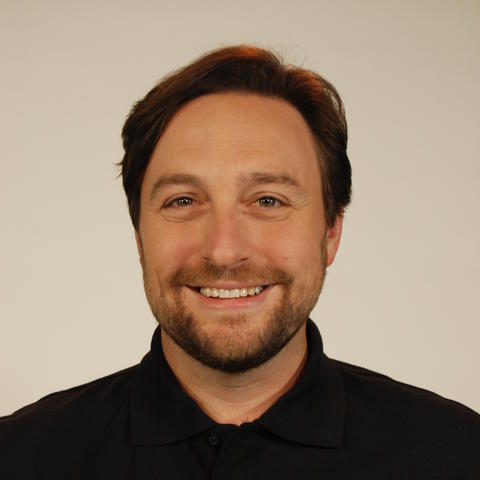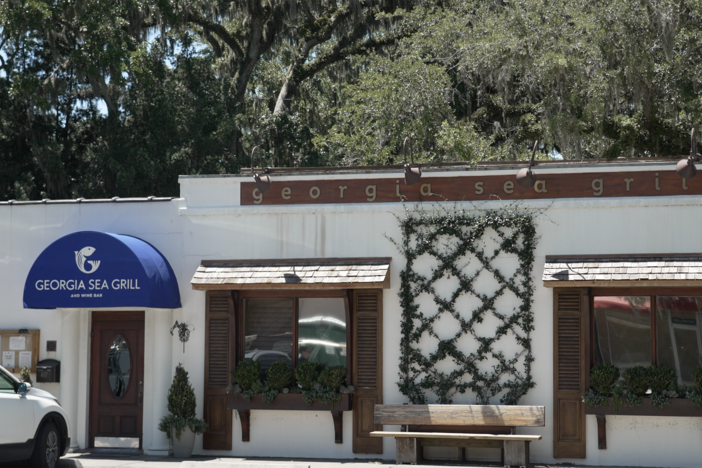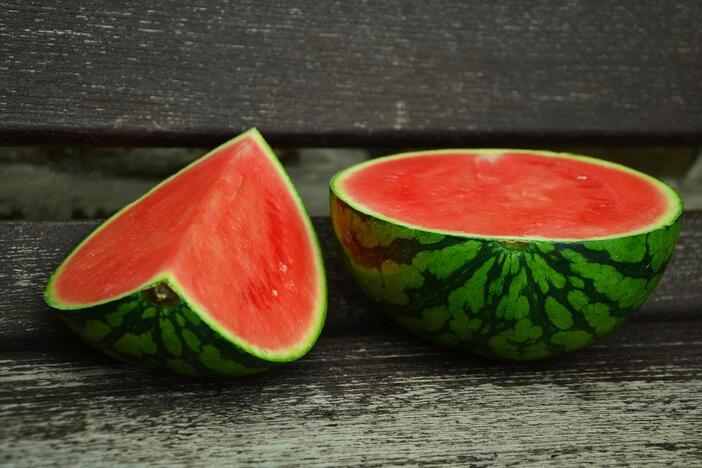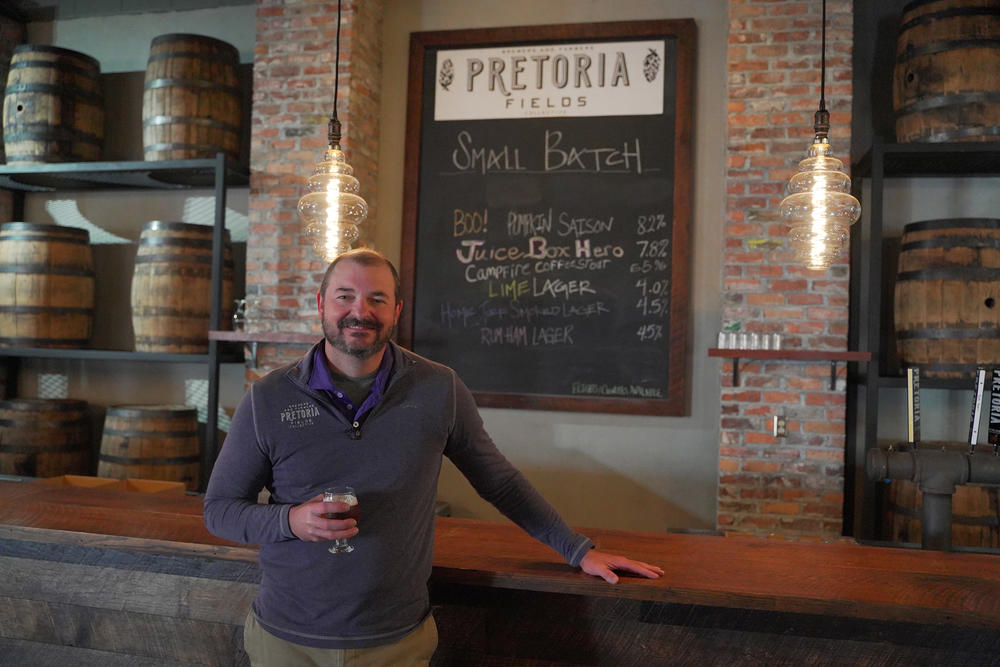
Section Branding
Header Content
A Fork in the Road Podcast: Pretoria Fields Collective
Primary Content
A doctor in Southwest Georgia is promoting sustainable organic farming while brewing beer and producing CBD products. And the brewery and taproom has given an economic boost to downtown Albany. This is Pretoria Fields Collective.

(TRANSCRIPT)
Dr. Tripp Morgan: Besides the government building, none of the buildings were full. And now? Now we've only got two buildings that are empty. In every glass we're trying to promote South Georgia agriculture. So we want to promote organic farming, sustainable farming practices, and appropriate use of natural resources.
David Zelski: Beer. Some people celebrate with it. Others mourn with it. Some reports say that the first solid proof of beer production comes from the period of the Sumerians around 4000 B.C. Others claim that the earliest beer discovered is from 13,000 B.C. No matter which is true, we know that beer has been bringing people together in good times and bad for thousands of years. It's a tradition the world over. And in Albany, Georgia, it's a way of life.
Theme Song: I came from the mud, there's dirt on my hands. Strong like a tree, there's roots where I stand.
David Zelski: I'm David Zelski, and this is the Fork in the Road podcast, featuring the stories from Georgia's farmers, fishermen, merchants, artisans, chefs and others who help provide Georgia grown products to folks in the Peach State and beyond. Today, we're in the southwest corner of the state in Georgia's 10th largest city: Albany. Across the street from the Flint RiverQuarium is where you'll find Pretoria Fields Brewery and Pretoria Fields Collective.
Dr. Tripp Morgan: No, I'm a physician, actually. I come from a long line of pharmacists.
David Zelski: That is Dr. Tripp Morgan. Yep. Today we're talking to a doctor about beer. And we're going to talk to him about hemp, too. This is going to be a good one. All right. Well brewing, I guess. And the brewery was not your original profession.
Dr. Tripp Morgan: No, no, no. Yeah, not at all. No, I'm a I'm a physician. And so my dad and sister are both pharmacists. And he ran a small town pharmacy in Camilla, Georgia, for the entire my entire life. Now, we also had a family farm. And so my dad, he went to Vietnam and came back. He actually was an agricultural economics major. Never really used his AG degree. He ended up going to pharmacy school. Well, I came back after medical school and had established my practice and he had retired. And lo and behold, he wanted to farm. So we went into business together. I had a farm in Camilla and we bought a farm in Albany. I decided we wanted to do something a little bit different. So we had being in obviously in health and wellness, being a physician. We got our form organic certified, and we're going through that. We we did some small grains. We did blueberries and blackberries. And really were trying to find an added benefit for the products that we're already making. Omaha Brewing was doing well, and there they were sort of out in the middle of nowhere, kind of like we are out in Pretoria, Georgia. So trying to capitalize on agricultural tourism, We decided to open a brewery well after the downtown development found out about our project. They actually invested in us and moved my small idea of a small brewery on our farm to a much bigger idea of a large downtown brewery with the taproom and 30 barrel brewing facility. So it's so it went it really quickly went from a little project to a much bigger project. But staying the same with our idea of in every glass, we're trying to promote South Georgia agriculture. So we want to promote organic farming, sustainable farming practices and appropriate use of natural resources. Part of that promotion is we've done through our partnerships. And one of those is with the Flint River Keeper. And you said you like our beer Shoalie. Well, it's named after the shoal bass and we give 2% of all the sales back to back the Flint River Keeper for sustainable habitat management for that particular product. So so we're trying to get be not only are we trying to promote agriculture, but be good stewards to our environment locally and as well statewide.
David Zelski: Dr. Tripp is doing a good job of that. First, moving the brewery to downtown Albany has been really good for the city.
Dr. Tripp Morgan: We opened December 7th, 2018. When we came down here. There, besides the government building, none of the buildings were full. And now, now we've only got two buildings that are empty. So it's really spurred development in the downtown area.
David Zelski: Dr. Tripp also mentioned that their goal is to promote South Georgia agriculture, and Pretoria Fields is doing exactly that.
Dr. Tripp Morgan: We grow Cascade Hops. They've done very well the past two years. We've had enough to do a small batch of wet hop beers through through hops that were grown specifically on the farm. So that's been awesome. We've continued to propagate the hops that we have. So we're up to a little over an acre now or acre, acre and a half. And so that particular part has done awesome. We've it took us we started this project five years ago just thinking about the things that we wanted to grow, grew for different types of barleys. We've done three or four different types of wheat, oats, corn, all looking at all looking at varietals that our brewers wanted to use it so we could then propagate and use those and then tell other farmers about what we're doing to try to try to spread the wealth. I guess a good way to think of it, Yeah.
David Zelski: It's got to be kind of neat having a blueberry farmer and, you know, different, different fruits. All these, these folks that you're helping support by putting their product in your beer, how important is it to you to have these South Georgia farmers be a part of this collective?
Dr. Tripp Morgan: Oh, gosh. I mean, huge. So. So the biggest products and, you know, we're not the we're not helping we're not helping the the industrial farmer. I mean, we're helping the smaller guy have a you know, the guy who's not farming as many acres is as you would think about with those things. He's maybe he's maybe trying to get involved in some other products besides corn, cotton and peanuts. And so blueberries, blackberries or traditional grains that we're that we're trying to promote something, you know, organically grown, sustainably farmed. And, you know, of course, not genetically modified, of course. And even if where we can substitute antiquarian grains or things from things that maybe were more traditionally grown around here.
David Zelski: When people are drinking your beer, how much of Georgia can they have in that beer?
Dr. Tripp Morgan: Yeah, it depends on which one it is. Right? So so hops. There's really interesting hops that come from all over the world. And so we certainly want to be able to provide that. So like Shoalie itself is a West Coast IPA supposed to be West Coast IPA. You know, it's got, it's got that particular flavor to it, but Skywater, which is our golden ale. All of the grain is grown in Georgia was malted in Georgia. So it's 80% Georgia grown. And you commented on our Berry Gose which is one of our seasonals. Yeah I'm super proud of that one because we coriander and sea salt are berry wheat berries were grown right here and the blueberries and blackberries are grown right here. So for almost all of our beers now, we're 50% plus as far as which what ingredients actually came from Georgia. And a lot of that came from us going out and recreating a barley production in South Georgia, which really hadn't been done since the seventies.
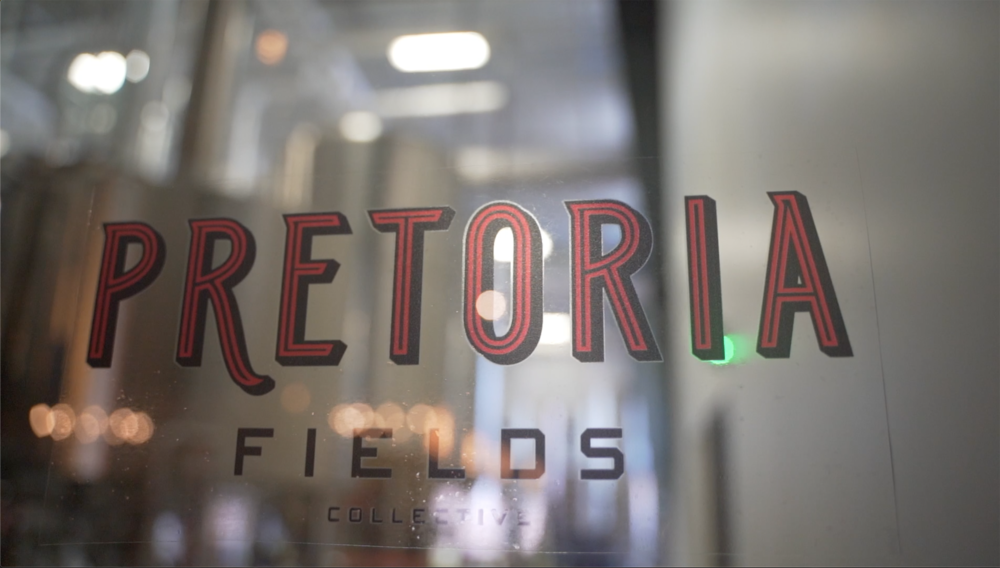
David Zelski: And since Pretoria Fields is striving for sustainable organic farming. Is the beer they brew a healthier option?
Dr. Tripp Morgan: Well, that's what we're trying to do, right? I mean, so, you know, all the products that we're making are either being organically grown or they're being grown with as few of the farm products as we can. So some of our farmers, they still grow industrially, right? But we just ask them to limit the amount that they can for sure.
David Zelski: We always hear about wine having all these great components, you know, health components related to wine, and you don't hear about it as much from beer.
Dr. Tripp Morgan: Yeah. So this is a great book, Dr. Li, food and health and disease. And so he describes the health benefits that have been found in beer. And the chemical actually starts with an x,xamoterol or something. I don't know exactly how you say it, but but it has a chemical properties similar to that that we always talk about which is good in wine. So they did find it in beer. So that's a thing.
David Zelski: Score one for the beer doctor. And beer is not the only thing at Pretoria Fields collective. There's also hemp.
Dr. Tripp Morgan: So we thought it would make sense for us, for our business, our business model. Because of my background in medicine, we try to promote health and we're promoting health through organic farming and we're promoting healthy, sustainable farming. And if I can get people to think about thinking that way, then maybe we can get them to think about how cannabis could also be, you know, is a sustainable farming product. I mean, it's been grown well, it's probably been grown with this ever since we started farming, meaning thousands, thousands, if not tens of thousands of years. The products itself were used, have been used to feed everything from the cattle and then you eat cattle to get the products, you know, the the product itself out of it, to be able to use the stem itself for clothing, to be able to use the roots for tea. It has to be grown organically though. And so it's a universal extractor out of the out of the dirt. So it'll it'll it'll pull up any organic molecules so if. If there's pesticides or against phosphates or heavy metals in the ground and you're not farming appropriately, you can actually create a product that's harmful, not helpful. So it's very important that you know where your hemp is coming from or your cannabis products or your CBD is coming from. Because of that practice and also because of this idea that I feel like we have to have industrial farming. I mean, there's no doubt we couldn't feed all the people, not only in the United States but in the world without it. But at the same time, industrial farming is making us sick. I mean, there's more there's increase in diabetes, hypertension, rheumatologic disease. All of these things have gone up over the past year. The number one increase in rheumatol in autoimmune disease is actually with farmers. And so why is that? Because they're exposed to one idea is that they're exposed to a lot of chemicals to be able to create those those products.
David Zelski: So how can hemp help?
Dr. Tripp Morgan: You look at the residual chemicals in corn, cotton and peanuts, and what you've got is you're spraying your corn, but the residue is built up over the years and and it's also killing your peanuts or you're spraying your cotton and it's it's injuring your corn or one of your other products later on. One of the ideas with sustainable hemp farming or adding that say into a rotation crop, which is one of the things that we were promoting in the state of Georgia, would be that it would pull up, pull out all or pull out a lot of that residual and actually clean the ground. And so so let's say you do corn, cotton, peanuts and then help for fiber. Now we couldn't use that hemp for CBD or its medicinal components because it's actually concentrated a lot of those chemicals within its leaves. So but there's no reason why. And it's grown just like a lot of the crops that our local farmers are already used to. So so you would be taking in that instance and possibly making industrial farming just a little bit safer. And so I think the way all of that's going to happen is that we're going to we're going to we're going to continue to find ways to make organic farming better and and and more. And be able to do it better and be able to scale it up on a bigger level. But also, we're going to be able to make industrial farming safer through hundreds of little things like that where hopefully the two things will meet in the middle, you know, And not only that, you know, you think about costs. So what's the cost for diabetes every year? What's the cost for hypertension disease? What's the cost for for rheumatologic disease where you know, where there's got to be some benefit that society sees that they put back in being able to both promote organic farming as well as promote the idea of making industrial farming safer.
David Zelski: This isn't just a business for Dr. Tripp. It's a service. It's a public good. 143 miles northeast of Albany is Cobbtown, Georgia. This is where some of the hemp is grown for Pretoria Fields collective. And through the magic of podcasting, we can jump right to the Handy Kennedy Farm.
Handy Kennedy, Jr: My name is Handy Kennedy Jr.
David Zelski: Okay. Handy Kennedy Jr. We're on Handy kennedy Road. Tell me about this farm and what's going on behind me.
Handy Kennedy, Jr: Basically, this farm, the legacy of this farm been in the family of 1869. Right after slavery my great grandfather, Handy and Elizabeth Jane, bought 175 acres from a guy by the name of Cobb which Cobbtown it basically name after of. He bought it by about 175 acres that he passed 175 acres on to his son. His son, Marshton Kennedy, before his passing grew it to like 1700 acres. And then when my grandfather split it up amongst his 13 kids, my father bought a thousand acres of it. And this is where we sit right now is on the thousand acres that my father bought from his father, Marshton Kennedy. So which includes about 1000 acres. But all together now, we farm about 1200 acres.
David Zelski: How did you get started in this?
Handy Kennedy, Jr: I started researching hemp probably about 2017, just kind of reading up. I'm basically reading on seeing what they were doing out West. I was already intrigued about hemp. I knew that I believed him with the industrial revolutionary crop, and I knew they were going to bring some opportunity for small farmers like ourselves to give us an opportunity to make some extra revenue. And when I really started researching and learning out about the different aspects of it, and what you can really do with hemp with the CBD, with the seed, and with the fiber. I knew that this was going to be a crop that we had to really invest in on ground level. And so therefore, I researched it. And when Georgia passed a law to allow us to start growing, I started researching processors that really had the best interest of small farmers in mind, and I ran across Pretoria Fields. They had a couple of presentations throughout the state where they were trying to recruit farmers to grow on very small acreage or hemp, which were perfect for me, you know, because it's a very expensive crop to grow and with them allowing me to grow one one or two acres was perfect. And so after going to a couple of meetings and listening to their leadership team explain to them what they were trying to do, I realized they were going to be the best fit far as processors in Georgia for for H.K. Farm.
David Zelski: This is the very definition of neighbors helping neighbors. Now we need to know what Pretoria Fields is doing with the hemp grown by Handy Kennedy Jr.
David Zelski: There's a lot of misunderstanding because it's newly legal, you know, with cannabis between marijuana and hemp. There is a difference in that product.
Dr. Tripp Morgan: Oh yeah, definitely so. So anybody who farms understands the idea of different cultivars and so cannabis sativa and cannabis indica and, and even when it was brought from, brought and used for medicinal purposes, the indica plant was always the one that was considered sort of the smokable herb that got you high. And the sativa plant was the fiber hemp that was used to make paper and clothes and used it for tea and, and, and then use the seeds as, as the other components. Now there are lots of different now there are many, many, many cultivars of both of those. And so that doesn't totally hold true as far as the plant biology goes. I mean there's books written about it, but just for a simple understanding, the hemp varieties that we grow, the THC genes or the genes that make that would would make it marijuana, quote unquote. I don't like that term, but but that's what most people think about it as.... They're knocked out. So they don't actually they're they're not activated in that particular plant they're growing. And everything has to be as far as the state law under 0.3% THC. So and the other the other thing that people need to realize is that we're growing it for a high CBD content and the increase in the CBD actually suppresses THC effect. So there's several different reasons that it both has the beneficial effects and it also doesn't have the euphoric effects.
David Zelski: I do like how well-studied Dr. Tripp is. He hasn't gone into this venture willy nilly. No, he's done his homework. A group of farmers, physicians, and pharmacists brewing beer and creating CBD products. That's Pretoria Fields Collective in Albany, Georgia. So the next time you're in downtown Albany, be sure to visit the brewery and the taproom. Thank you for joining me on this episode. Did you know that you can watch A Fork In The Road on GPB-TV or any time on the GPB.org website. That's where you'll also be able to listen and subscribe to this podcast or download it on your favorite podcast platform. I'm David Zelski. Thanks for listening to A Fork in the Road.
The A Fork in the Road TV show airs Saturdays at noon and Sundays at 6:30 a.m. on GPB-TV. Check your local listings for other replays throughout the week and watch all episodes anytime at GPB.org/ForkintheRoad. Please download and subscribe to the Fork in the Road podcast at GPB.org/ForkintheRoadpodcast or on your favorite podcast platform as well.
A doctor in Southwest Georgia is promoting sustainable organic farming while brewing beer and producing CBD products. And the brewery and taproom has given an economic boost to downtown Albany. This is Pretoria Fields Collective.

